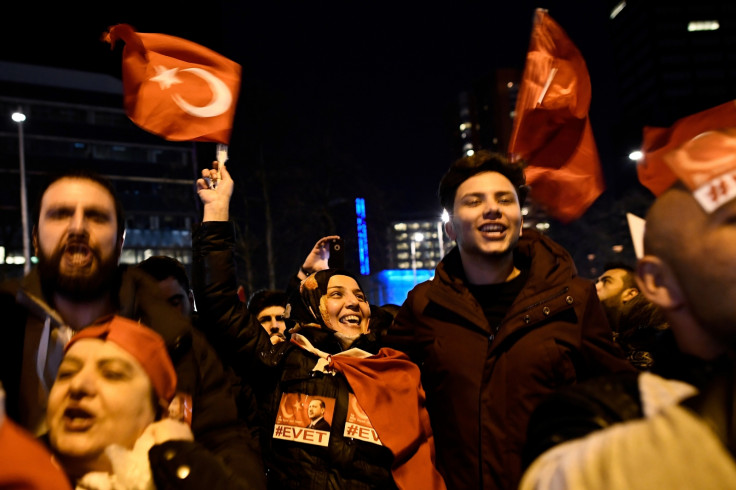Spat deepens between Netherlands and Turkey over Erdogan's Nazism slur
Turkish leader warns the Dutch they will 'pay the price' for stopping Turkish ministers holding referendum campaign rally to build support for power-grab proposals.
A diplomatic standoff has deepened between Turkey and the Netherlands and drawn in other European countries over the Dutch blocking of two Turkish ministers leading to protests and accusations of Nazism by the Turkish president.
Recep Tayyip Erdogan said the Netherlands would "pay the price" for stopping the Turkish ministers from addressing Turks in Rotterdam and called for international organisations to impose sanctions on Amsterdam.
"If you can sacrifice Turkish-Dutch relations for an election on Wednesday, you will pay the price. I thought Nazism was over, but I was wrong. In fact, Nazism is alive in the west" he said.
The election in the Netherlands on Wednesday (15 March) pits prime minister Mark Rutte's freedom and democracy party (VVD) against Geert Welders far-right anti-Islam Freedom Party (PVV).
The government is fearful of any pro-Erdogan rallies sowing division within the Netherlands' Turkish population during already-heightened tensions in the country.
But Rutte said the decision by Fatma Betül Sayan Kaya to come to Rotterdam by car regardless of the foreign minister, Mevlut Cavusoglu, being banned, was unprecedented and called on Erdogan to apologise.
European countries backed the Dutch, taking exception in particular to the Nazi slur.
In France, Cavusoglu was allowed to hold a rally in Metz but the French centrist presidential candidate Emmanuel Macron condemned the "unacceptable comments" by the Turkish government. Beleaguered conservative candidate Francois Fillon said the event where the foreign minister would speak should not have been allowed in the first place.
The Danish prime minister, Lars Loekke Rasmussen, said the rising tensions meant that an upcoming visit to Copenhagen by his Turkish counterpart Binali Yildirim should be postponed in light of "the current Turkish attack on Holland", the Associated Press reported.
Elsewhere in Europe, it emerged that a Turkish campaigning rally due to take place in Stockholm had been cancelled. Austria's foreign minister said no Turkish rallies would not be allowed on its territory.
The rallies are intended to drum up support among Turkish expatriates to back a referendum in April to move the country from a parliamentary to a presidential republic, giving Erdogan more powers including appointing ministers, choosing judges and enacting laws.

© Copyright IBTimes 2025. All rights reserved.






















